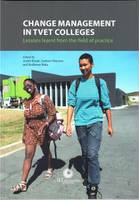TVET context
The Technical and Vocational Education and Training (TVET) colleges environment is marked by increasingly stark juxtapositions between what needs to be achieved in the post-school education sector and the increasing difficulty of current conditions.The ‘triple challenge’ of poverty, inequality and unemployment’ weighs heavily on the social, political and economic fabric of the country and expectations are high that the TVET colleges can make a pivotal contribution to counter these challenges
There is huge pressure to accommodate enrolment in colleges. In 2014, 71.3% of all unemployed people in South Africa were in the youth age group from 15 to 34 that is the biggest source of demand for post-school education. This amounts to more than 3.7 million people.
The TVET colleges are in a phase of unprecedented enrolment growth. Head count students numbers have risen from 325 000 in 2010 to 725 000 in 2015 and with a further substantial increase to 1 200 000 mooted by 2019. These figures are highly impressive as they stand.
Despite laudable increases in TVET enrolment, the education system needs to work harder to accommodate weight of demand for post school FET band qualifications from young people not in education, employment or training. At the same time it is vital to secure adequate quality in TVET programs which depend so much on the competence and commitment of college lecturers.
Purpose of collection in light of TVET context
This collection offers an important opportunity through a set of research papers that provide the reader with new analytic and empirical material:
- to contemplate a key conundrum of the TVET colleges - the limited apparent impact of successive phases of institutional transformation undergone;
- to wrestle with the daunting challenges facing the TVET colleges, particularly the tension between expansion -in a period of fiscal constraint- and quality
Accordingly, chapters in this collection address: the political economy of TVET types in different countries which, by comparison, illuminate the South African case; a periodisation of government interventions in the TVET sector over the last three decades; the unsettled state and status of TVET lecturers in relation to their job requirements and conditions of service; the halting evolution of collegial relationships between college lecturers towards higher collegiality; employer expectations of college graduates and how colleges are responding; and an analysis of the outcomes of a college improvement intervention in Limpopo and the Eastern Cape
The chapters were selected because they:
- Highlight key perspectives from macro- to micro- through international comparative study and interrogate how macro-economic and political factors shape TVET systems;
- Provide a perspective on the quality, timing, impacts, and outcomes of government policy, identify key government policy and implementation features and evaluate their overall impact;
- Bring to light the experience of TVET lecturers who are central participants in any proposal to renovate colleges by: unpacking the formal and informal structures which facilitate and constrain TVET lecturer development, and reveal fragmentation of lecturer collegial relations which detract from individual and institutional development.
- Draw on employers’ perspectives about the preparedness of TVET college graduates seeking work in their respective sectors.
- Bring forward insights into the CIP program from the CIP monitoring and evaluation program.
This collection introduces the following papers:
- An international comparative study that examines how macro-economic and political factors shaped TVET systems over three decades of restructuring in the United Kingdom, Netherlands and South Africa. Prof Andre Kraak
- Analysis of the unfinished project of South African TVET transformation: the quality, timing, impacts, and outcomes of successive phases of government policy, and implementation since 1994 Dr Anthony Gewer
- Qualitative analysis of TVET lecturer experiences revealing compound fragmentation of lecturer collegial relations which detracts from individual and institutional development. Prof Volker Wedekind & Dr Zanele Buthelezi
- Investigation of non-subject matter barriers that confront TVET teacher’s efforts to achieve and retain their own levels of competence and motivation so as to meet the academic and social needs of students. Under the burden of enrolment expansion. Dr Ronel Blom
- Enquiry into employer’s expectations of TVET college graduates, and their perceptions about the employability and preparedness of these graduates for work in the Tourism and Hospitality, Engineering, and Wholesale and Retail sectors. Prof Joy Papier, Seamus Needham, Nigel Prinsloo & Timothy McBride
- An appraisal of how a large scale and relatively long duration intervention program – the College Improvement Program - could impact on the TVET colleges and addressing the interwoven processes of implementation and institutional response. Carmel Marock & Eleanor Hazell
Who would be interested in the book?
This book will offer valuable information and insights for readers interested in the recent past, or the future trajectory of South African TVET colleges.
It will provide a source of reference and analysis for:
- readers who need to update their own knowledge on key themes in the TVET space
- decision makers requiring a perspective on the current state of TVET colleges as an integral part of post-secondary education sector
- analysts of institutional change in TVET colleges and other public sector education institutions
- observers of links between education and economic growth and of TVET Colleges graduate employment rates
Download a copy of: Change management in TVET colleges: Lessons learnt from the field of practice
Hard copies may be ordered from African Minds
